Gamma function
extension of the factorial function, with its argument shifted down by 1, to real and complex numbers From Wikipedia, the free encyclopedia
Remove ads
In mathematics, the gamma function (Γ(z)) is a key topic in the field of special functions. Γ(z) is an extension of the factorial function to all complex numbers except negative integers. For positive integers, it is defined as [1][2]

The gamma function is defined for all complex numbers, but it is not defined for the non-positive integers. For a complex number whose real part is a positive integer, the function is defined by:[2][3]
Remove ads
Properties
Particular values
Some particular values of the gamma function are:
Pi function
Gauss introduced the Pi function. This is another way of denoting the gamma function. In terms of the gamma function, the Pi function is
so that
for every non-negative integer n.
Remove ads
Applications
Analytic number theory
The gamma function is used to study the Riemann zeta function. A property of the Riemann zeta function is its functional equation:
Bernhard Riemann found a relation between these two functions. This was published in his 1859 paper "Über die Anzahl der Primzahlen unter einer gegebenen Grösse" ("On the Number of Prime Numbers less than a Given Quantity")
Remove ads
Related pages
References
Further reading
Wikiwand - on
Seamless Wikipedia browsing. On steroids.
Remove ads







